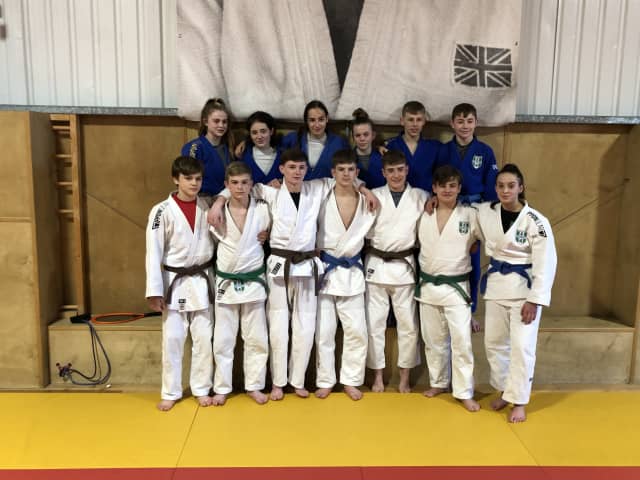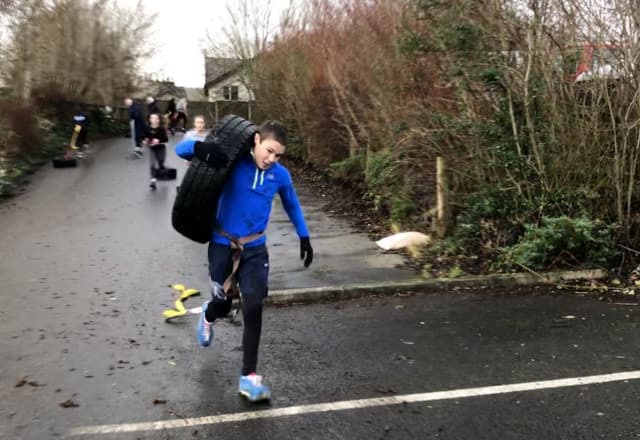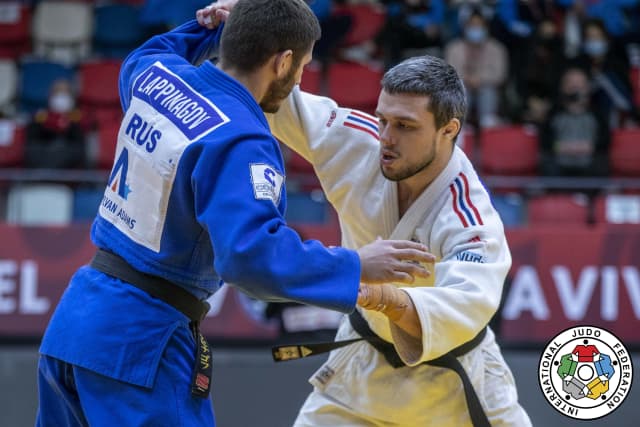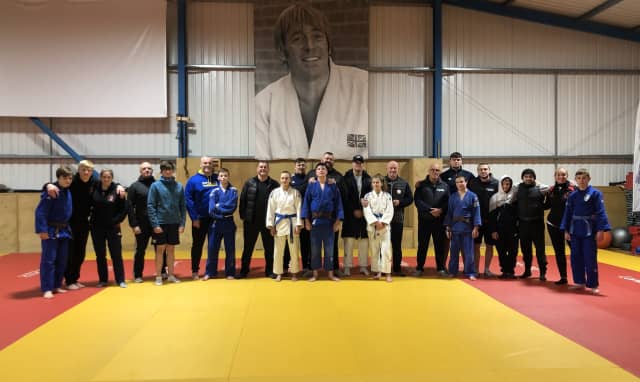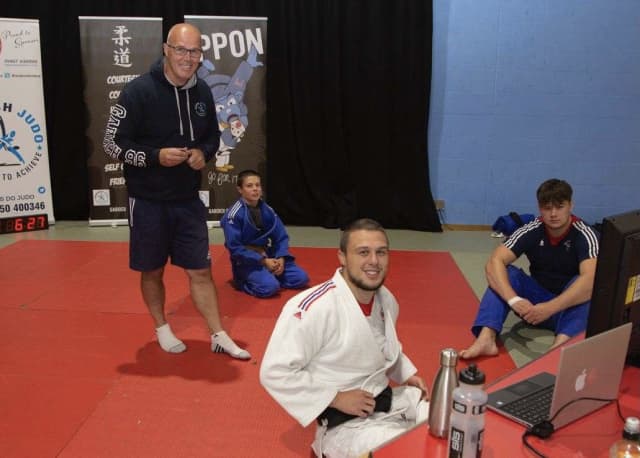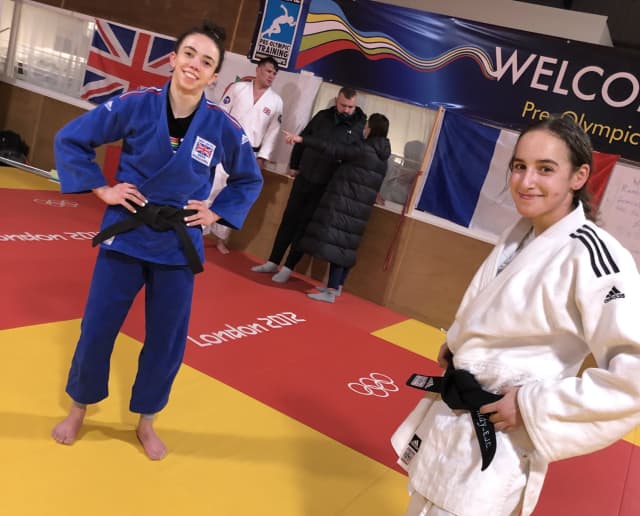It could be surmised that the oldest in our communities may have been hit hardest, with their health an obvious flash point, especially at the beginning of this era, striking a chord in the media.
But…
Our teens, in judo terms our cadets, the world over, have endured now around 15% of their lives in this pandemic. For two years out of maybe 15, they have had to manage the withdrawal of their social peers, school closures and the resulting loss of learning, changes in financial security with many parents being out of work, constant negative media coverage which has been cited as a catalyst for decades that feeds the perceptions of our more impressionable generations and perhaps the most damaging of all is the anxiety and stress felt throughout and the product of that being a reluctance to rely on positive hope for the future; how can our youth have a secure vision of their lives over the years to come, when their weekly parameters are altered so regularly and dramatically, impacting freedoms and operational procedures for the most basic life tasks?
Judo as a sport and a lifestyle, certainly at a local level, has seen its own trends among the cadets, trends which are still evolving and require additional investigation. It is an enormous task for national federations to work towards combating the impact of Covid on the many different demographic groups of judoka affected. In research terms, the period is young and is not finite, with huge variables across age categories, gender, location, pre-Covid conditions and more. This makes tackling the consequences of the pandemic a minefield.
Judo as a contact sport has been hit hard with club closures, the inability to train outside in colder climates, a lack of tournaments beyond the IJF level, coaches being unable to work and many other knock-on effects. Dwindling numbers, although not universal, are still significant.
What is clearly key to both participation and progress is access to training. For many not in a sporty environment at home, this has been challenging to solve and some of our teens haven’t made it, making sedentary choices or choosing fitness activities that do not require partners, indoor mats or niche coaching.
Despite the numerous negatives there is still a great demand for judo and our hardcore of cadets is ploughing forward, solving the unknown as well as they can. There is a clear effort being made to capitalise on government-sanctioned windows of opportunity, with the organising of training camps, competitions and face-to-face seminars whenever the rules allow, albeit with numerous measures remaining in place to keep all participants as safe as possible. Most governing bodies have reacted relatively quickly, as have independent providers.
In Kendal in the north of England there is a traditional winter camp, which has been running since the mid-1980s, focusing on a mix of tatami-based sessions and outdoor conditioning. Last year it was cancelled, understandably. This year it’s back and has provided attendees with a much-needed injection of intensity alongside the benefits that come from a shared experience and the gathering of young people all in one place.
160 people arrived in Kendal over the first weekend of January 2022, from as far south as London and as far north as Aberdeen. The British senior national team were in attendance, including 2021 Olympic bronze medallist Chelsie Giles and a host of World Judo Tour medallists and they punctuated a field of cadets, juniors and -15s, most of whom are contenders at national level and some even on the international scene.
Young judoka participating in the camp were keen to train but also keen to discuss their situation, their approach and their ideas. Ross McWatt is 15 and is the younger brother of Stuart McWatt, who has competed at 4 world championships to date and has numerous continental open medals. Middle brother, Andrew, aged 20, is also pushing forward now as a newer member of the British team. Their coach is their dad, Stuart senior and so life is a judo-fest and this is an interesting dynamic, especially with what it alludes to in the middle of this pandemic.
Ross gave us a lot of his time, “Judo has been there since forever, for as long as I can remember. I didn’t have any other reason to begin, it’s just always been my life. When I turned 8 I started competing and really enjoyed that so I kept going. Always in the back of my head I’ve had my brothers to live up to and sometimes putting that pressure on myself has held me back a little bit. I see what they achieve at each age and have compared myself thinking maybe I couldn’t be as good as them. Every time they’re training at home I can see that they’re better than me but that’s normal as they’re older and of course more experienced."
"Before lockdown I had set small goals as an -15 player, to place in the top 8 at the National Cadet Championships and then to medal in my second year. Last year’s event was cancelled due to Covid and I just missed out last month, placing 5th in what should have been my second year.
There were so many moments in lockdown where I could have given up. Even now with, us back in training, it doesn’t feel back to normal and I think it’s still having an impact. There are a lot of ups and downs.
People say, ‘well you’ve got your brothers to train with in the back garden’ and therefore thought I was in a great position but with nothing else to fill my time, this idea played in mind and it turned out to be a negative thing. I had no school so I just trained and trained and trained. I ended up overtraining and not thinking about anything else. I became quite ill. I always give my all to everything I do and so I’ve had to really work hard to learn how to hold myself back and measure it a bit more successfully. It took family intervention and long-term contact with a sports psychologist to really help me straighten myself out. There’s still a lot more work to do.
I’ve always felt that I don’t like losing and so I thought that working towards it, to stop myself losing, was the best way. It might also help me catch those I had to live up to, even though no-one ever said it like that.”
Losing is normal, essential and even the greatest judoka have experienced it. Ross knows that but knowing it and managing it are two different things, especially when the intensity of life has changed in the Covid era.
“This whole period has ended up being a catalyst for managing it better at the British Championships than I would have before. Usually I punish myself when I lose, for extended periods but this time I was able to look at both the good parts and poorer parts of my performance and find some balance. I have spoken to the therapist, who was helping me manage my illness and more recently their support has helped me manage my approach to losing and to sport in general.
In the past I’d have not enjoyed judo or my daily life for some weeks after the event and would have been pretty unhappy. There’s more to life than simply winning though and that is a concept that will come with me into life beyond sport. I am starting to learn to like the whole process rather than just the results. I’m now enjoying training for its own sake. Before I did too but there were some weeks that I didn’t enjoy as part of a long run up to competition.
The pandemic really brought out into view the issues I was trying to manage. I don’t think I realised how unhealthy I had become and only with that prolonged period at home did it all become clear. In that way I think the pandemic saved me from much longer term issues that could have had a disastrous impact on my life later on.”
In Kendal it was noticed that Ross wasn’t the only cadet attending with a whole family in tow. In fact there was a disproportionate number of ‘judo families’ there, with the club coaches being both coach and parent to many young judoka, between them.
Here we can see a huge number of judo families present. Maybe this says something about what it takes to keep our teens in the sport through such a challenging time. These judoka have had the default benefit of total absorption into the judo lifestyle and they have either seen or worked with their coaching parents to solve the obstacles that have been presented. Where many cadets have had their face-to-face training cancelled for lengthy periods, with no facilities to train how they’d like at home, those with coaching parents have been able to access more than most.
In this group is Gary Edwards, who competed at world level and is now Scottish National Coach, with his daughter. The Calders are well known, with dad Lee being a coach for both Ireland and Trinidad & Tobago. John Buchanan is here with his son Joe. John won a world bronze in Munich in 2001 and now runs a branch of the Sportif network in Scotland.
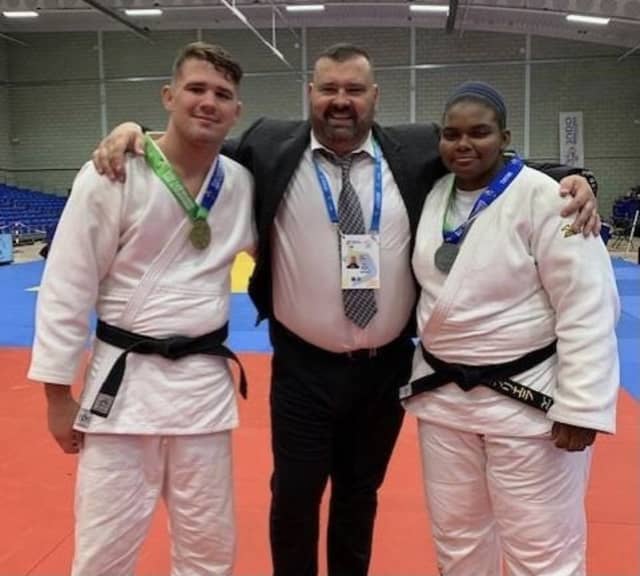
Gary Edwards said, “Honestly, I don’t know if I could go though this again. Judo has been in my life for the best part of 40 years and without it, life is very different. I have the strategies to cope and have still found it horrendous so I really feel for our youngsters and hope we will all be able to support them during what is bound to be a very long rebuilding phase. There mental health has to be the priority and all of us have had struggles this past two years and can relate to what they’re going through.”
Thinking further about the cadets, Charlie Ayre is a 16 year old judoka from Gateshead Judo Club and his coach is multiple European medallist and Olympian Chloe Cowen Vickers. Chloe has been communicative throughout the pandemic, facilitating as much consistency as possible but Charlie also has a judo parent with his father being a former member of the British team.
Charlie spoke about his experience, “It’s been hard to keep going with no close goals to work towards. I’ve had a coach-led training programme but it’s still very hard to get any actual judo in. I think it’s been a positive time in terms of my physical training and I’ve grown a lot, from -46kg to -60kg, getting a lot stronger. I have come through it reasonably well. I needed someone to push me, a schedule to work through but once I had that it was more manageable. A daily routine was key. I’ve also had my dad to do bits of gripping work with, here and there.
I saw some people around me not quite make it and just fade away as they couldn’t motivate themselves to keep training but I couldn’t let that happen to me.
Doing the work through lockdown has given me the belief that I can accomplish personal goals, I can stick to a programme. For example, I will have to improve my flexibility over the coming months and after the two years we’ve had to train through, I know I can get it done.”
Ross continued, “Being part of a real judo family, not just Garioch Judo in Aberdeen but in my home, gets me quite excited sometimes. There are big possibilities. First is to medal at the British!”
Ross then turned to an issue that is likely to be affecting a great number of the world’s cadets and younger judoka, “Beyond the months leading to the British Championships at the end of this year, I struggle to see any further. The pandemic has put me off setting longer term goals. There is no certainty that we will be able to achieve them because the rules and the opportunities are changed and withdrawn so often now.
So, day to day I want to be better than those around me at school, in all my subjects. Of course that transitions to how I want to improve in judo too. I struggle a lot with my own performance in the short term and my perception of a lack of improvement. If I have a bad session it ruins the rest of my day. I just think about it all the time. I think that’s among my goals for the near future, to work on that.
It’s easier to get past it when there are people around you. During lockdown it was very isolating, no-one to speak to, to take my mind off it. So now things are more open and although things are still not settled, we are all working on it and there is sight of a bit more normality.”
We can all relate to Ross’ cautious observations of the settling of our environments but it’s not yet plain sailing, “It’s hard with my dad being the coach. Coach and athlete is sometimes a hard transition to dad and son. Both of us struggle to manage those situations.”
Stuart senior has been in the same position as all the parents in the group photo, working almost in a vacuum, using experience to try to manage the demanding juggling of both parental and coaching tasks, with no precedent set to look back on.
Stuart noted, “None of us expected Covid and certainly not for it to go on this long. Trying to manage my family and my judo club has been hard. I try to always treat my sons as individuals but with Covid any issues seemed magnified and I suppose it gave us the chance to help Ross, a chance that may not have occurred without this anomaly. That doesn’t mean it’s been good, just that it’s highlighted some things for us.”
Ross spoke of some other effects of the last two years, “I think we are the most affected by Covid. We are supposed to be out meeting new people and socialising. A lot of my friends struggle with communicating now, they’re quieter than they used to be. It’s like losing the momentum with learning how to grow up and become the best they can be. We all struggle to look into the future. What if there is another lockdown?
For those of us who have been doing judo throughout, even online, we knew it was always there and it really was there when we came back. In a way it has been the stability in very uncertain times. For non-judoka I can’t imagine what it has been like.”
With this observation of the high number of judo families working together in Kendal and the testimonies of the cadets themselves, it is clearer than ever that this period has had and continues to have a lasting and detrimental effect on everyone, even those who can celebrate some positives too.
Judo has been cited as a scaffold, even when so much of it has been missing over the last two years and the more we, as a sporting community, can communicate with our younger generations, the more likely we are to be able to provide stability. Judo values, as well as its people, offer so much more than sport and when it’s removed from us we prove that finding access is a top priority.

